Eating certain foods can help the body produce more collagen. There is no need to eat bone broth which is the richest food in collagen. Consuming various foods rich in high-quality protein, vitamin A, vitamin C, iron, zinc, copper, sulfur compounds, omega-3s, chlorophyll, carotenoids, or other antioxidants stimulates the synthesis of collagen and inhibits its degradation!
What is collagen?
Collagen is a protein. Actually, it’s the most abundant protein in the human body. Collagen is approximately 30% of the human body’s protein content.
It is mostly found in connective and soft tissues, such as tendons and ligaments. Also, collagen is found in the skin, corneas, blood vessels, gut, intervertebral discs, bones and teeth.
Collagen is responsible for skin strength and elasticity. Additionally, collagen can prevent the formation of wrinkles. Thus, collagen has potent anti-aging properties.
As a protein, collagen is made from amino acids. The most common amino acids of collagen are glycine, proline, and hydroxyproline. Other amino acids, such as glutamine, glutamate, ornithine, and arginine are also important for the synthesis of collagen.[1]
Moreover, various minerals (copper, iron, and zinc), vitamins (vitamin A and C), and oxygen are important cofactors for the synthesis of collagen.[2,3,4]
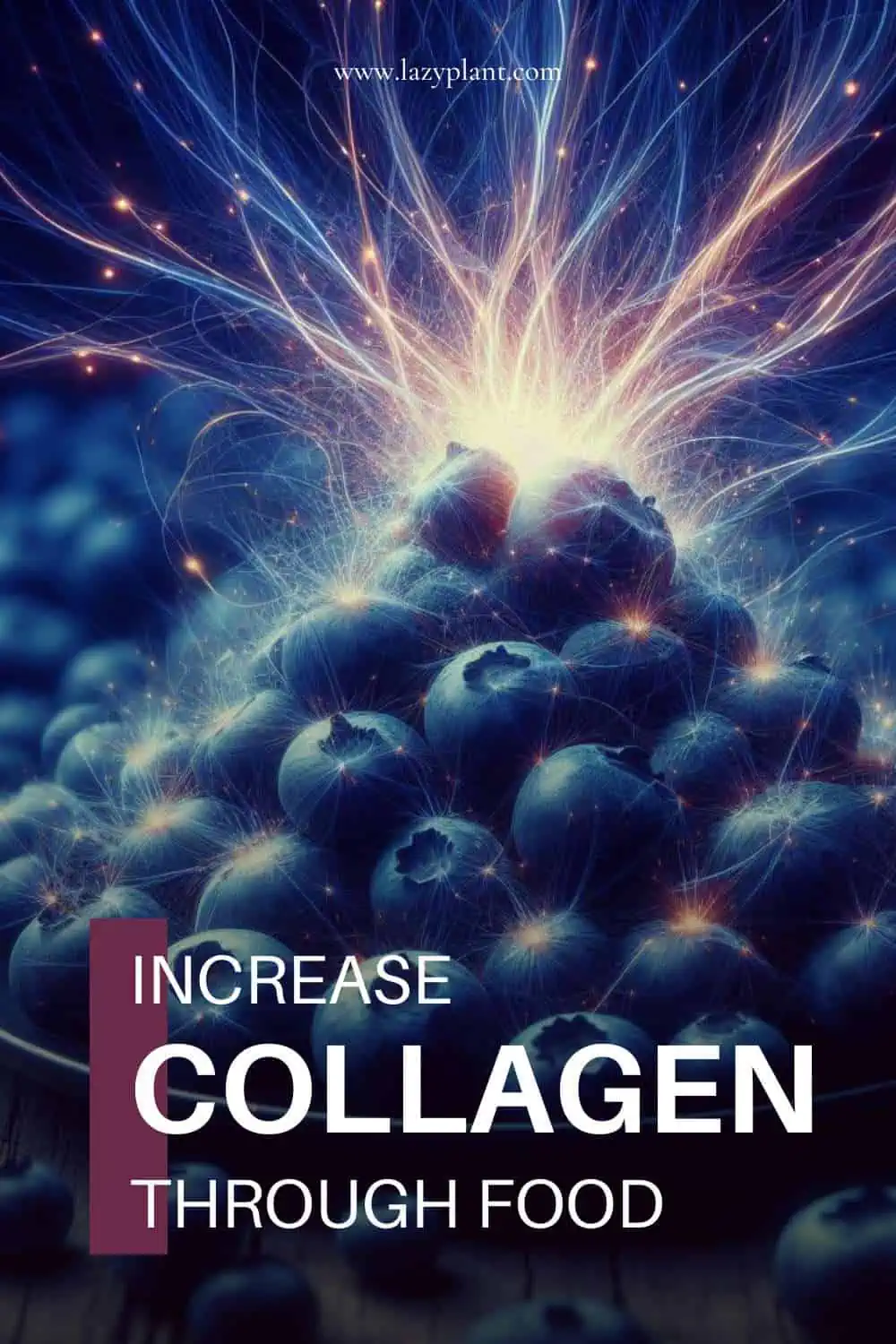
The human body naturally produces collagen
The human body can synthesize collagen naturally. It synthesizes collagen by combining amino acids, which are the building blocks of protein.
A healthy whole food plant-based diet can provide all the amino acids that the human body requires for collagen synthesis. Also, we have to consume foods high in vitamin C, vitamin A, zinc, copper, and iron.
Our bodies produce new collagen every day. However, the produced amount may not be enough in many cases. After the age of 20–25 years, we start to lose more collagen than we produce. Especially, if we don’t eat foods that stimulate collagen synthesis. Less collagen causes wrinkles, saggy skin, and weakened joints.
Furthermore, lifestyle factors, such as smoking, stress, air pollution, and exposure to harmful ultraviolet rays of the sun contribute to collagen depletion.
A whole food plant-based diet is the best solution to increase collagen production and protect your skin from aging.
Should I take collagen supplements?
Actually, there is no need for healthy people to take collagen supplements if they follow a well-balanced diet. Collagen supplements have collagen peptides, which are slightly different from natural collagen. Collagen peptides are made of the same amino acids. But, they have shorter chains of amino acids. Hence, they are absorbed more easily.
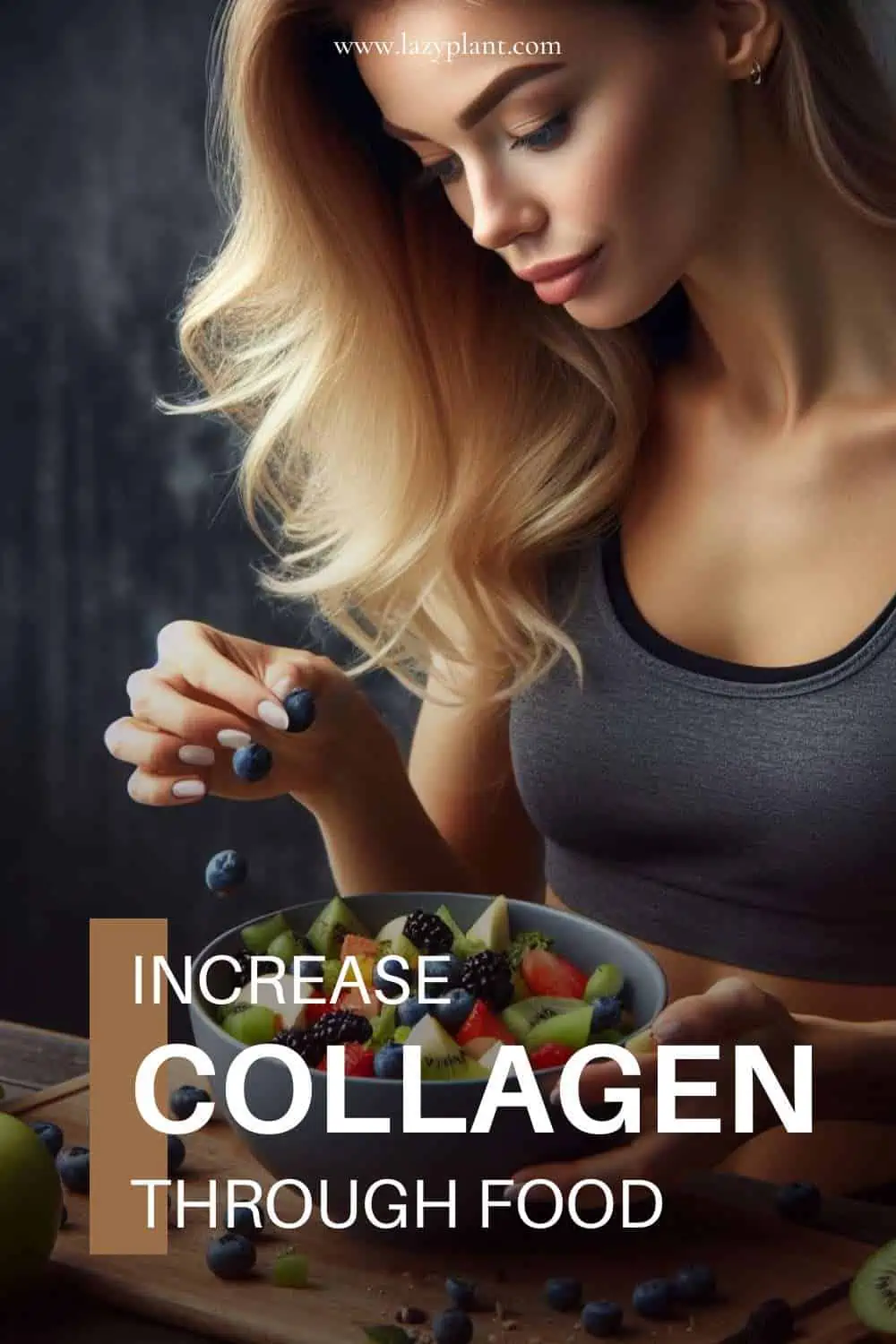
Some health benefits of collagen peptides are.[5]:
- skin elasticity
- recovery of lost cartilage tissue
- reduced joint pain
- strengthened tendons and ligaments
- increased lean body mass in elderly men and premenopausal women
- increased bone mineral density in postmenopausal women
The main reason for these health benefits is that collagen peptides provide the necessary amino acids to the human body in order to synthesize collagen. We can get these amino acids from diet, though.
How much collagen should I take a day?
Many studies have shown that daily collagen doses of 3 grams can improve skin elasticity. Scientists didn’t observe any side effects even for dosages higher than 10 grams.[6]
You can find a wide variety of collagen supplements on iHerb.
Foods high in collagen
Only a few foods contain collagen. Collagen is concentrated in connective tissues. So, only animal sources are good dietary sources of collagen.
The food with the highest amount of collagen is bone broth. It contains amino acids like proline and glycine that are essential for collagen synthesis.
Salmon and other omega-3-packed fish also support collagen production and skin health.
Eggs also play a beneficial role in collagen production, as it’s particularly rich in amino acids. In fact, it’s considered the most bioavailable dietary protein source. It contains high amounts of proline and lysine which are crucial for collagen synthesis. Also, omega-3s in eggs may increase collagen levels as well.
Eating foods high in collagen doesn’t necessarily mean that this collagen will be used to keep your skin elastic. The human body will break down collagen into amino acids. These amino acids will be used wherever they are needed the most.
Vitamins & minerals that stimulate collagen synthesis
Vitamin C
Many studies have shown that vitamin C is essential for the synthesis of collagen. Vitamin C regulates and maintains the intercellular amount of collagen. Also, vitamin C is good for the skin as it has potent photoprotection properties.
Consuming foods high in vitamin C is necessary for increased collagen synthesis! Even topical application of vitamin C may enhance collagen production in the human skin. So, it’s better to prefer cosmetic products and collagen supplements containing vitamin C.
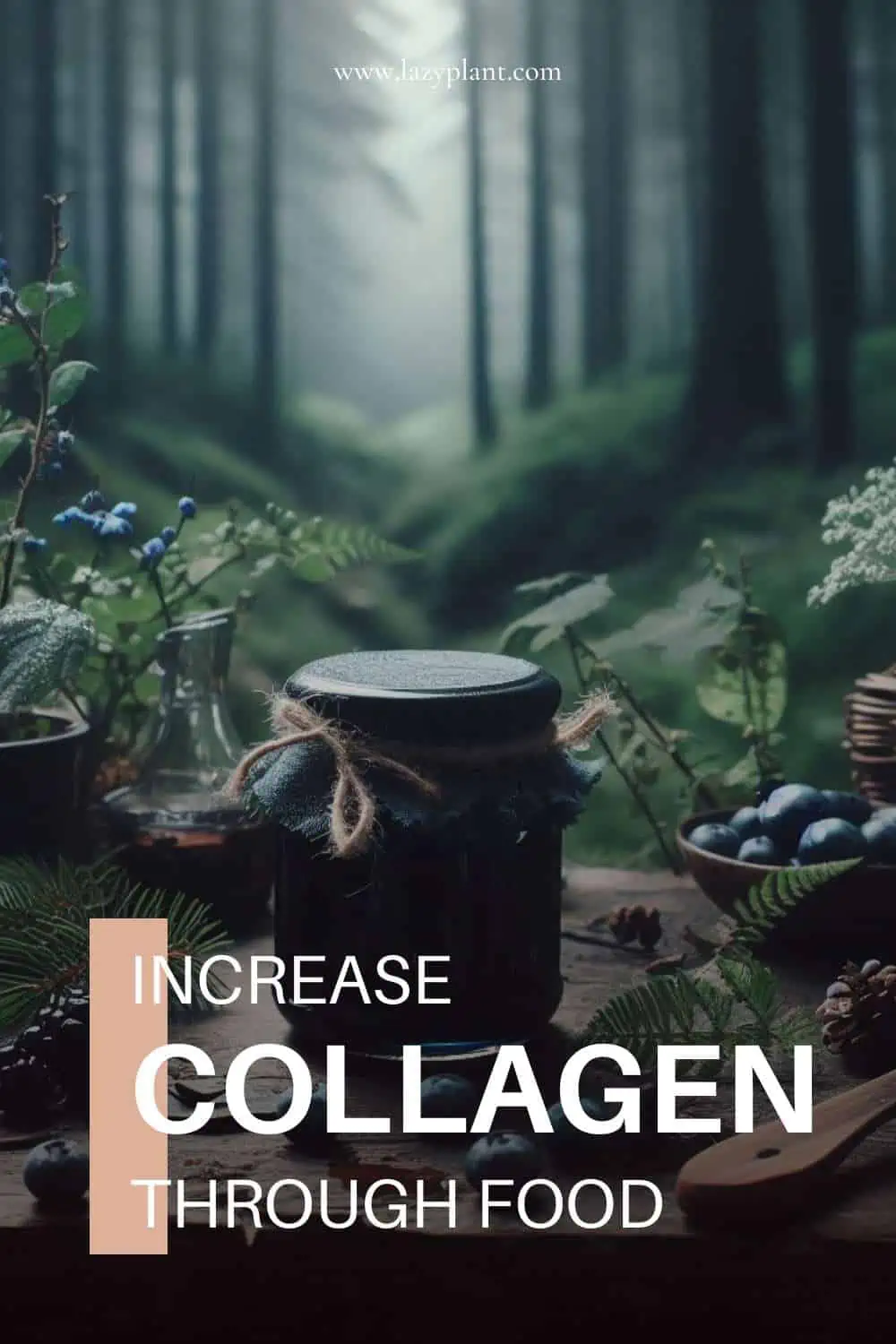
Normal skin contains high concentrations of vitamin C, which supports important and well-known functions, stimulating collagen synthesis and assisting in antioxidant protection against UV-induced photodamage. Vitamin C has the potential to increase type I collagen synthesis and may enhance soft tissue healing.[7,8]
Vitamin A
Vitamin A is also vital for collagen synthesis. You can get high amounts of vitamin A from animal-derived foods (retinol), or plant-based foods (beta-carotene).
Lycopene in tomato may also protect against collagen degradation and UV damage. Only a few foods are good natural sources of this powerful carotenoid.
Zinc
Zinc is important for the skin. It’s beneficial for collagen production as well. Seeds and nuts are great dietary sources of zinc.[9,10]
Copper
Moreover, eating foods high in copper can be beneficial for connective tissues, such as ligament and tendons, bones, and the skin. Copper also plays a key role in collagen metabolism. Copper is vital for the synthesis of elastin as well. Elastin is a protein that makes the skin elastic. Copper deficiency may have a negative effect on collagen and elastin synthesis.[11,12]
Iron
Furthermore, copper is essential for the absorption of iron. Iron is also vital for the collagen production process and for its structural integrity. Actually, iron is a key cofactor for elastin and collagen synthesis.
Foods high in iron are seeds, nuts, whole grains and beans (e.g. lentils, soybeans).
Omega-3 fatty acids
Omega-3 fatty acids may also play a role in collagen synthesis. According to a study, EPA supplementation (a type of omega-3) may improve ligament healing.[13,14]
Seafood as well as certain seeds and walnuts are good dietary sources of omega-3s.
Certain foods stimulate natural collagen synthesis
Aloe vera
Aloe vera is one of the most beneficial foods for the skin. It contains over 70 potentially beneficial for the skin compounds. For instance, aloe vera is a good dietary source of vitamins, enzymes, minerals, lignin, saponins, salicylic acids and amino acids.[15]
In fact, aloe vera promotes collagen synthesis because it’s rich in amino acids. Aloe vera has 20 of the 22 required amino acids for the synthesis of collagen. Moreover, it has 7 of the 8 essential amino acids.
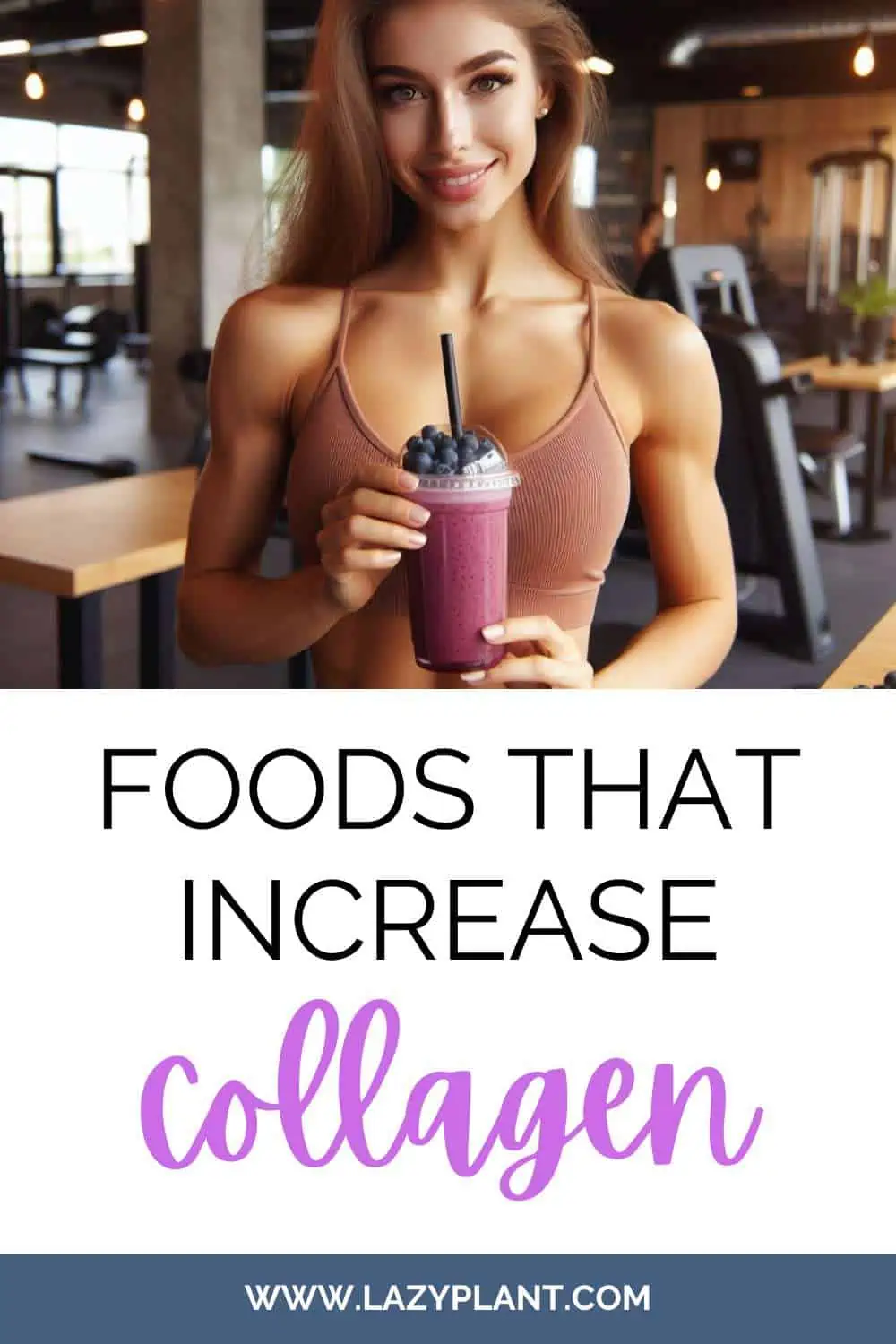
Additionally, aloe vera can increase the synthesis of hyaluronic acid, after oral or topical treatment.
Green tea
Furthermore, green tea contains many compounds that can prevent the natural decline of collagen. Green tea is a good source of tannins, catechins, and other polyphenols, which protect the skin from oxidative stress. Green tea is beneficial for several dermatological conditions.[16,17]
Berries & herbs
As berries and herbs are the richest foods in antioxidants, they also protect against collagen degradation caused by free radicals.
Garlic
Garlic has unique active compounds that can prevent the formation of wrinkles. The most important of them are caffeic acid, S-allyl cysteine, and uracil. Moreover, these compounds in garlic can significantly inhibit the degradation of collagen.[18]
Actually, diets high in sulfur compounds are beneficial for preventing collagen breakdown.[19]
Chlorophyll
Also, foods high in chlorophyll increase collagen synthesis. Chlorophyll may increase procollagen production which is a precursor to collagen. Moreover, chlorophyll can reduce the formation of wrinkles and skin DNA damage.[20]
Water
Above all, we should stay well-hydrated. Collagen metabolism requires water. Among other health benefits, water supports collagen structure.
If you neglect drinking water, at least try to consume foods rich in water. Various vegetables and fruits are over 90% water. Many foods that boost collagen production tend to be high in water as well.
Healthy recipe ideas for increased collagen synthesis
Here are some healthy, easy, and quick recipe ideas to promote collagen synthesis:
- Salmon salad: Combine grilled salmon with leafy greens, kale, spinach, and avocado. Dress with a lemon juice and olive oil vinaigrette.
- Avocado and egg toast: Mash avocado on whole-grain toast and top with a poached egg. Sprinkle with a pinch of chia seeds.
- Walnut-crusted salmon: Coat salmon fillets with crushed walnuts and bake until golden. Serve with a side of steamed broccoli.
- Orange glazed chicken: Cook chicken with an orange glaze made from orange juice. Include garlic for added flavor.
- Berries and yogurt parfait: Layer mixed berries with Greek yogurt. Top with a sprinkle of chia seeds and chopped walnuts.
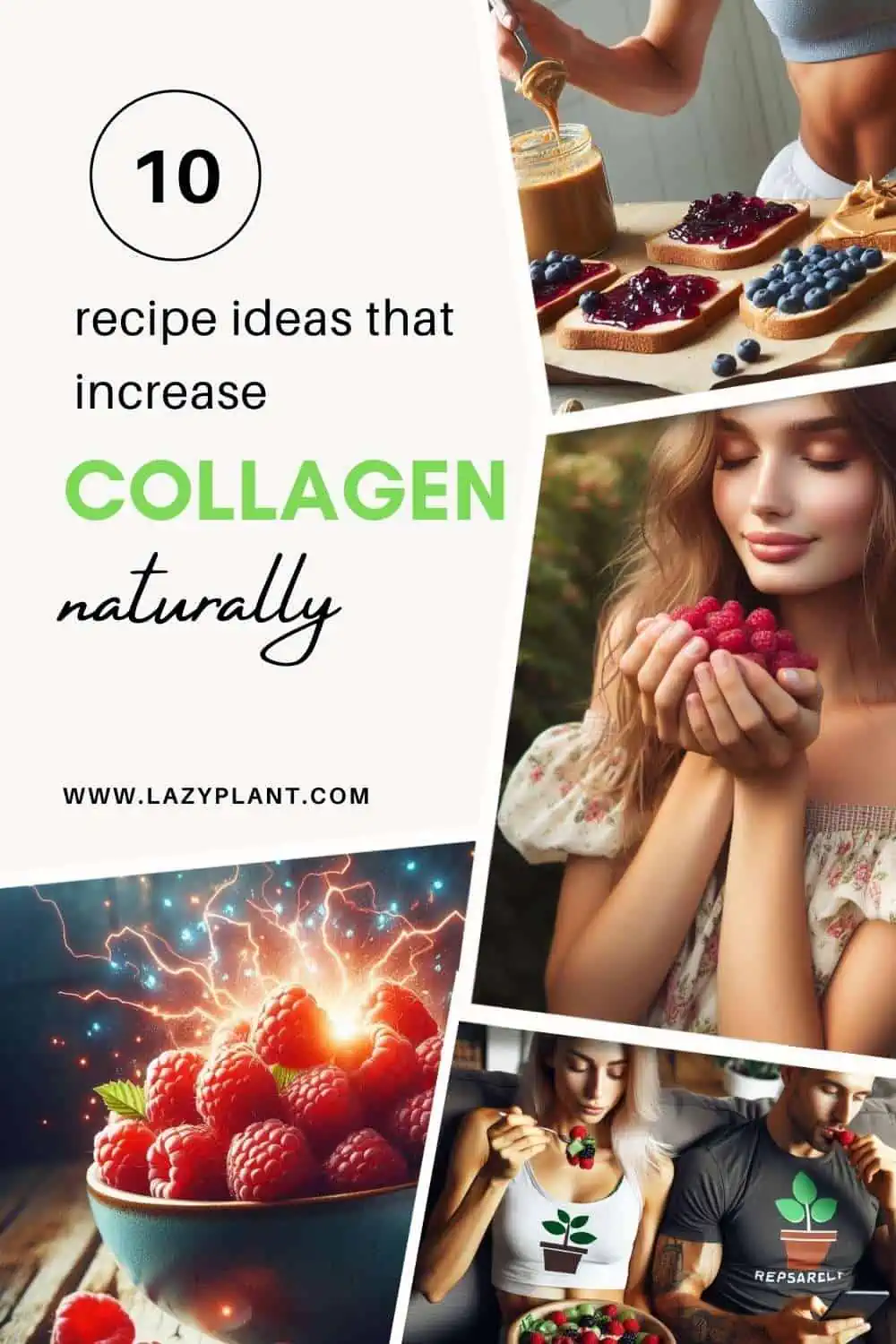
Vegan snack ideas
- Garlic roasted broccoli: Toss broccoli florets with minced garlic and olive oil. Roast until crisp and serve as a side dish.
- Spinach and berry salad: Mix spinach, berries, and sliced oranges in a bowl. Drizzle with a lemon juice and olive oil dressing.
- Avocado and berry smoothie: Blend avocado, mixed berries, and a splash of orange juice for a collagen-boosting smoothie.
- Berry smoothie bowl: Blend blueberries and strawberries with chia seeds and a splash of orange juice. Top with walnuts for added crunch, protein, and omega-3s.
- Kale and bean soup: Prepare a hearty soup with kale, beans, and garlic. Add a squeeze of lemon juice for freshness and extra vitamin C.
These recipes incorporate a variety of collagen-promoting foods and can be easily prepared for a delicious and nutritious meal.
What’s the best time to eat foods rich in collagen?
There isn’t a specific “best time” to eat meals rich in collagen, as the body continually undergoes the process of collagen turnover.
However, you could include collagen-rich foods in various meals and snacks throughout the day to ensure a consistent supply of amino acids needed for collagen synthesis.
Consuming collagen-rich foods after a workout may be beneficial as well, as exercise can stimulate collagen production.
Consuming collagen-rich foods before bed is also beneficial for collagen production, as the body undergoes repair and regeneration during sleep.
Furthermore, you could pair collagen-rich foods with sources of vitamin C, as vitamin C is essential for collagen synthesis. Foods like citrus fruits, strawberries, broccoli, kale, and bell peppers are good choices.
Which foods are bad for collagen?
It’s good for you to avoid foods high in sugars and refined flour. These foods tend to cause chronic inflammation, which is bad for the production and structural maintenance of collagen. So, avoid sweets, white bread, and highly processed products to protect your skin from aging.[21]
Smoking, sun exposure, and alcohol abuse also reduce collagen synthesis rates in the skin.[22]